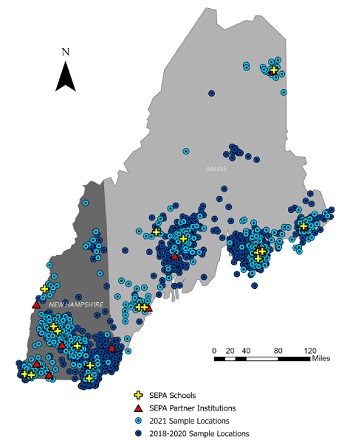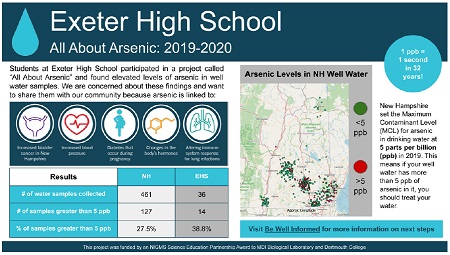Superfund Research Program
October 2021

Researchers at the NIEHS Superfund Research Program (SRP)-funded Center at Dartmouth College and collaborators quickly identified challenges and realistic solutions for their citizen science project, All About Arsenic, during the COVID-19 pandemic.
Nearly half of the population in Maine and New Hampshire rely on private wells, which often have elevated arsenic levels due to natural geological features.
By partnering teachers and researchers throughout Maine and New Hampshire, All About Arsenic engages students as citizen scientists to expand private well water testing for arsenic and other hazardous substances while building environmental health and data literacy.
The project was initiated in 2015 as part of an NIH Science Education Partnership Award in collaboration with researchers at the Mount Desert Island Biological Laboratory. It equips teachers and students with the tools, skills, and resources to make sense of water quality data and move from data to action. Students collect well water samples, enter data into an online portal, use online tools to visualize and interpret the data, and share findings through community meetings and other activities.
When in-person classes and activities were on hold due to the COVID-19 pandemic, the Dartmouth team had to quickly re-think how to keep students motivated and engaged and to facilitate community outreach.

They worked collaboratively with teachers to develop alternatives to public meetings for community outreach and designed additional outreach materials to take the strain off teachers struggling with the rapid transition to online learning.
With input from teachers and partners, they refined their approach, moved much of their project online, developed data literacy modules and videos, and created additional virtual tools and resources.
They also developed a data to action toolkit to help students learn how to talk about science and write a letter to the editor.
The researchers evaluated the effectiveness of these adaptations with an end-of-year survey. Nearly all teachers reported the toolkit, data literacy modules, and videos to be somewhat to very helpful in engaging their students in outreach activities.
According to the team, most if not all, of the COVID-19 adaptations and interventions made significant improvements to the project overall and will be maintained after the pandemic is over.


